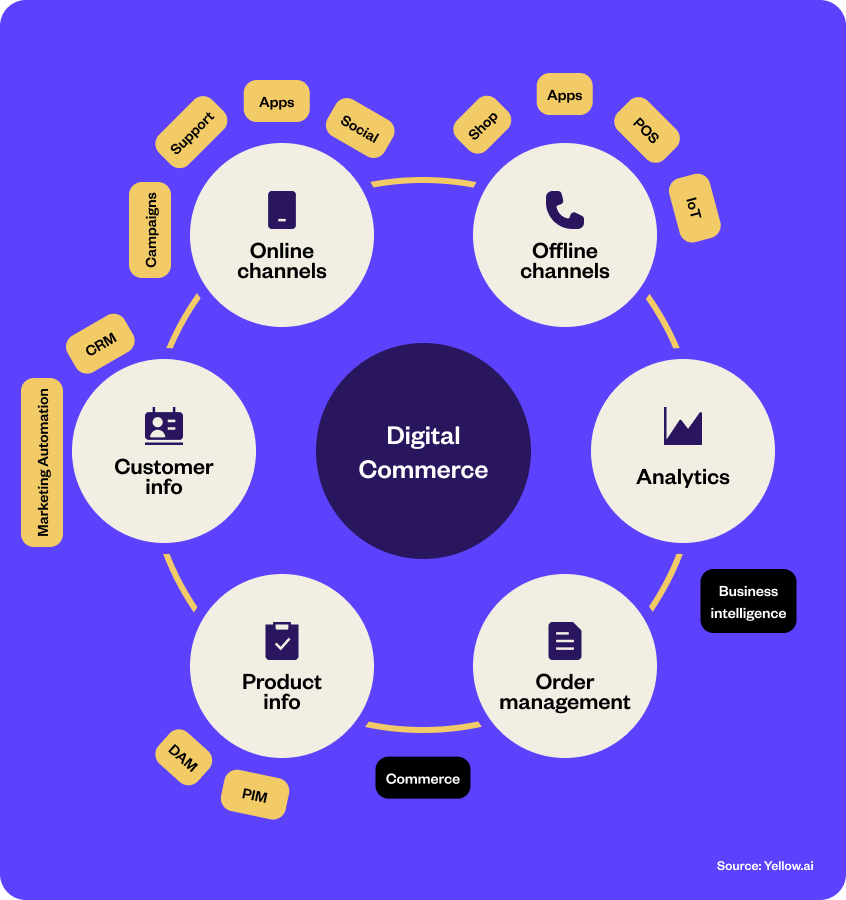Retail CX is undergoing a structural shift. The chatbots of yesterday can’t support the complexity of today’s customer journeys, let alone tomorrow’s. Customer expectations in retail and digital commerce are evolving faster than traditional systems can handle. Legacy support tools like scripted chatbots were once revolutionary, but in today’s landscape of real-time interactions, omnichannel shopping, and emotionally nuanced service, they’re quickly becoming obsolete.
The modern customer journey demands more than reactive support. It requires AI agents that are intelligent, outcome-driven systems built to understand context, act autonomously, and scale across every channel your customers use.
What is digital commerce?
In simple terms, digital commerce is a blend of processes that provide customers with the ability to buy products and services online without contacting any human resources. It is based on delivering a completely self-serve customer experience.
As per a definition from Gartner, digital commerce enables customers to purchase goods and services through an interactive and self-service experience. It includes the people, processes and technologies to execute the offering of development content, analytics, promotion, pricing, customer acquisition and retention, and customer experience at all touchpoints throughout the customer buying journey.
All the facets from marketing and promotions to customer data management are critical to building a wholesome digital commerce platform.

Why Traditional Chatbots No Longer Meet Customer Expectations
The gap between customer expectations and chatbot capabilities has never been wider. While shoppers demand instant, personalized, and contextual support across every touchpoint, traditional chatbots remain trapped in outdated frameworks that can’t adapt to the complexity of modern commerce journeys.
The Limitations of Scripted Automation
Most chatbots in e-commerce today still operate on rigid, rule-based logic. These systems rely on predefined flows that fail to grasp nuance, intent, or emotional tone. The result? Dead-end conversations that frustrate shoppers rather than help them.
Even basic integrations, like checking real-time order status, often break due to limited connectivity with backend systems such as ERPs or OMS platforms. This creates friction across the journey, especially when customers expect instant answers.
Related Read: AI Chatbot vs. AI Agent: What’s the Difference?
The Problem with Slow, Siloed Support
Today’s shoppers don’t want a ticket number, they want real solutions, now. Traditional customer service funnels often lead to siloed interactions, where escalations lack context and customers repeat themselves across agents and channels. This not only increases handle times but also erodes brand trust.
Modern support must be proactive, intelligent, and unified, something rule-based systems simply can’t offer.
AI Agents: Built for Omnichannel, Outcome-Driven Support
As digital commerce grows more complex, customers expect seamless, personalized support at every touchpoint, from mobile apps and social messaging to voice and email. AI agents represent a significant leap beyond traditional chatbots, transforming support from a reactive function into a proactive, revenue-enabling capability.
Whereas legacy bots rely on decision trees and keyword matching, AI agents are designed with true intelligence, adaptability, and enterprise-grade connectivity at their core.
What Makes AI Agents Different
AI agents aren’t just an upgrade, they’re an entirely new architecture for modern customer engagement.
1. Advanced Sentiment Analysis and Emotion Detection
Modern AI agents go far beyond keyword matching to understand the emotional nuance and context behind customer communications. This emotional intelligence enables more empathetic, effective interactions.
Multi-Modal Emotion Detection: Advanced AI agents analyze text sentiment, voice tone, typing patterns, and even response timing to gauge customer emotional state. A customer typing quickly with lots of typos might be frustrated, while someone asking detailed questions about return policies might be anxious about a purchase decision.
Emotional Journey Mapping: AI agents track how customer sentiment evolves throughout interactions and across multiple touchpoints. This helps identify friction points in the customer experience and optimize future interactions.
Adaptive Communication Styles: Based on detected emotions and customer preferences, AI agents adjust their communication style, response length, and tone. An anxious customer might receive more detailed explanations and reassurance, while a frustrated customer gets direct, solution-focused responses.
Escalation Intelligence: Sentiment analysis helps AI agents make smarter escalation decisions. Rather than escalating based on keywords alone, they consider emotional context, customer value, and resolution complexity to determine the best path forward.
2. Real-Time System Connectivity
These agents are built to integrate with your existing systems, CRM, OMS, ERP, WMS, loyalty engines, via APIs or native connectors. This means they can pull up order history, check delivery status, modify subscriptions, and even flag high-value customers for proactive service.
Example: An AI agent integrated with your Salesforce Commerce backend can autonomously cancel an order, trigger a refund, update loyalty points, and notify the customer in a single flow, all without human intervention.
3. Autonomous Task Execution
Unlike chatbots that pass issues to human agents, these agents can resolve Tier-1 and Tier-2 queries independently, reducing load on support teams and speeding up time-to-resolution.
They can:
- Cancel or modify orders
- Trigger refunds based on business policy
- Authenticate users securely via OTP/email
- Escalate to human agents only when necessary, with full conversation context attached
4. Context Memory and Cross-Session Continuity
AI agents maintain persistent context across channels and sessions. So whether a customer starts on WhatsApp and returns via website chat three days later, the agent remembers prior interactions, preferences, and outcomes, creating a frictionless journey.
5. Hyper-Personalization at Scale
Using historical interaction data, preferences, and behavioral signals, AI agents personalize offers, responses, and actions dynamically. This isn’t just about using a customer’s name, it’s about offering real value based on who they are and what they need now.
These personalization capabilities are just the beginning. The true power of AI agents emerges when they orchestrate complex, multi-faceted customer journeys that span weeks, months, and multiple touchpoints.
From Support Assistants to AI Shopping Advisors
The role of AI agents is expanding, from reactive support to proactive commerce enablement. They’re not just handling “where is my order” (WISMO) queries, they’re helping customers discover products, make faster decisions, and get more value from their purchases.
Here’s how AI agents are stepping up:
Product Discovery & Guided Selling
AI agents can ask clarifying questions, filter product catalogs based on customer preferences, and surface relevant recommendations, much like a virtual sales associate would in a physical store.
Example: “Looking for running shoes under ₹5,000 with arch support? Here are 3 top-rated options based on your previous purchases.”
Upsell and Cross-Sell Intelligence
Based on browsing history, past purchases, and cart behavior, AI agents can suggest relevant add-ons or upgrades that don’t feel intrusive, driving AOV (Average Order Value) without compromising user experience.
Multilingual, Multimodal, 24/7 Availability
With support for 135+ languages and dialects, Yellow.ai agents offer culturally relevant, emotionally aware interactions around the clock, whether via chat, voice, app, or WhatsApp.
Voice-Led Commerce Interactions
Through VoiceX, Yellow.ai’s enterprise-grade voice AI, customers can now speak to AI agents naturally, bypassing IVRs, menus, or wait times. From checking return eligibility to modifying delivery slots, voice agents handle it all in real time.
Experience VoiceX
Where AI Agents Deliver Value: Use Cases in Action
From streamlining post-purchase support to boosting conversions with intelligent recommendations, AI agents solve real problems across the retail journey. Here are high-impact use cases where they deliver measurable business outcomes.
| Use Case | Benefit | Business Impact |
| Order tracking and returns | 24/7 self-serve updates and refunds | Reduces support volume by up to 40%: improves first response time |
| Smart escalations | Escalates based on sentiment and urgency | Improves CSAT and reduces Average Handle Time (AHT) |
| Loyalty management | Handles redemptions, tier queries, and updates | Increases repeat purchase rate and drives program participation |
| Personalized upsell | Suggests add-ons and upgrades contextually | Boosts Average Order Value (AOV) |
| Multilingual support | 135+ languages and dialects supported | Expands CX reach across global markets; improves satisfaction in local segments |
Related Read: Retail AI Customer Service Automation
Real-World Impact of AI Agents on Retail & Digital Commerce
In a digital commerce environment where customer expectations are sky-high and patience is short, speed and personalization aren’t just nice-to-haves, they’re survival metrics.
AI agents are no longer experimental tools. They’re delivering measurable outcomes across CX, operational efficiency, and even revenue:
Higher CSAT, Faster Resolution
Retailers using Yellow.ai’s AI agents consistently report:
- 80-90% of Tier 1 queries resolved autonomously
These include common issues like order tracking, returns, product availability, and account queries, automated without sacrificing accuracy or empathy. - Increased lift in CSAT within 90 days
Thanks to faster resolutions, lower effort, and intelligent personalization, customers report a significantly improved support experience. - Reduced Average Handle Time (AHT) and improved NPS
With AI handling the routine, human agents focus on high-value conversations, driving loyalty and advocacy.
Pro tip – Support KPIs are your new revenue KPIs. CSAT, NPS, and AHT directly influence lifetime value, repeat rate, and margin.
Unified Omnichannel Experience
Today’s customers expect to start a conversation on one channel and finish it on another, without losing context. Most legacy chatbots fail here, forcing users to repeat themselves every time they switch platforms.
Yellow.ai’s AI agents are built for true omnichannel support:
- Support extends across voice, WhatsApp, in-app chat, web chat, social DMs, and email
- Customer context and conversation history persist across sessions and channels
- Conversations feel continuous, even when they’re interrupted or moved
This consistency reduces friction and increases trust, especially during high-stakes moments like escalations or returns.
While operational insights drive immediate improvements, the strategic value of AI agents becomes clear through sophisticated analytics that connect every interaction to measurable business outcomes.
Related Reads
- Agentic AI for Customer Support
- Customer Sentiment Analysis
- Yellow.ai Retail Solutions
- Voice AI in Retail
Key Benefit: Advanced Analytics & ROI Measurement
While traditional support metrics like CSAT and first-call resolution provide useful baselines, the true value of AI agents emerges through sophisticated analytics that connect customer interactions to business outcomes. Modern AI agent platforms provide deep insights that help retailers optimize not just support operations, but entire customer experiences and revenue streams.
Customer Lifetime Value Modeling Through AI Interactions
AI agents generate rich interaction data that enables sophisticated CLV modeling, helping retailers understand how support experiences directly impact long-term customer value.
Interaction-to-Revenue Attribution: Advanced analytics platforms track how AI agent interactions influence customer behavior weeks and months later. For example, a customer who receives proactive order updates might show 15% higher repeat purchase rates compared to those who don’t receive proactive communication.
Experience Quality Scoring: AI agents analyze conversation quality, resolution effectiveness, and customer satisfaction to create composite experience scores. These scores correlate strongly with future purchase behavior, enabling retailers to identify which interaction patterns drive the highest customer lifetime value.
Predictive CLV Adjustment: Machine learning models use AI interaction data to continuously update CLV predictions. A customer who frequently engages positively with AI recommendations might see their predicted CLV increase, triggering automatic upgrades to premium support tiers or exclusive offers.
Channel-Specific Value Analysis: Different customers prefer different communication channels, and AI agents track which channels drive the highest engagement and conversion rates for various customer segments. This enables optimized channel investment and personalized communication strategies.
Key Benefit: Attribution Modeling for AI-Assisted Conversions
Understanding how AI agent interactions contribute to conversions requires sophisticated attribution modeling that goes beyond simple last-touch attribution.
Multi-Touch Attribution Across Touchpoints: Advanced AI platforms track customer journeys across all touchpoints—from initial AI chat interactions to email follow-ups to final purchase. This reveals how AI agent interactions influence customers throughout their decision-making process.
Assisted Conversion Tracking: AI agents often provide product information, reviews, or recommendations that influence purchases made hours or days later. Advanced attribution models give proper credit to these assisted conversions, showing the true revenue impact of AI agents.
Cross-Session Influence Measurement: When customers interact with AI agents across multiple sessions before purchasing, attribution models track how each interaction contributes to the final conversion. This helps optimize AI agent conversation flows and content strategies.
Incremental Revenue Analysis: Sophisticated testing frameworks measure the incremental revenue generated by AI agent interactions compared to control groups who don’t receive AI assistance. This provides clear ROI calculations for AI agent investments.
Thinking of Performance Differently: Advanced KPI Frameworks Beyond Basic CSAT/NPS
While customer satisfaction metrics remain important, advanced AI agent analytics encompass a broader range of business-critical KPIs that connect customer experience to operational efficiency and revenue growth.
Customer Effort Score (CES) Optimization: AI agents track and minimize customer effort across multi-step processes like returns, exchanges, or account updates. Advanced CES analytics identify specific friction points and measure improvement over time.
Resolution Quality Index: Beyond simple resolution rates, advanced metrics measure resolution quality by tracking follow-up interactions, escalation rates, and customer satisfaction scores. High-quality resolutions prevent repeat contacts and improve overall efficiency.
Proactive Engagement Success Rate: For AI agents that initiate proactive outreach, success metrics include engagement rates, conversion rates, and customer feedback on proactive communications. This helps optimize when and how to reach out to customers.
Cross-Sell and Upsell Effectiveness: AI agents track their success at identifying and converting cross-sell and upsell opportunities, measuring both immediate conversion rates and impact on average order value and customer lifetime value.
Channel Migration Success: Advanced AI agents help customers move to more efficient self-service channels. Success metrics include channel adoption rates, customer satisfaction with channel transitions, and overall reduction in high-cost support channels.
Read more on: Customer Service Metrics That Matter in 2025: A Complete Guide to Measuring CX Success
How Yellow.ai Helps Retail & E-Commerce Brands Scale Smarter
Yellow.ai’s AI agent platform is purpose-built for the unique demands of modern retail and e-commerce, offering enterprise-grade capabilities that traditional support tools can’t match. Here’s how we enable retailers to transform customer experience while driving operational efficiency.
One Platform, All Channels
Today’s shoppers move fluidly across platforms, and your support needs to keep up. Yellow.ai delivers omnichannel continuity across chat, voice, app, web, and social. Whether it’s WhatsApp or your mobile app, the AI agent retains full context, ensuring customers never start from scratch.
Pre-Built for Commerce
Yellow.ai connects and integrates effortlessly with your existing stack, Shopify, Salesforce Commerce, Magento, SAP, Zendesk, and more. This means AI agents don’t just answer questions, they perform real-time actions like issuing refunds, updating order status, and managing loyalty, without human handoffs.
Real-Time Intelligence
With Yellow.ai Analyze, your team can monitor key metrics like containment rates, customer sentiment, and escalation patterns, all in real time. These insights help you optimize support flows, improve product experience, and align CX with business goals.
Voice AI & Enterprise Governance
Voice is still the most preferred channel in many regions. With VoiceX, customers get natural, emotionally aware conversations, no menus, no wait times. And with enterprise-ready controls around data privacy, auditability, and compliance, your AI stays transparent and trusted.
What’s Next: AI Agents as Revenue Enablers, Not Just Cost Savers
For years, AI in retail was viewed primarily through the lens of efficiency and deflection, a way to reduce support costs and scale without growing headcount. But that narrative is evolving.
Today, forward-looking brands are using AI agents not just to automate support, but to augment the customer experience, build loyalty, and fuel revenue growth.
Here’s how AI agents are becoming core drivers of top-line impact:
1. Higher Customer Lifetime Value (CLV)
AI agents enable hyper-personalized experiences that extend beyond transactional support. By remembering past purchases, preferences, and behaviors, they can recommend relevant products, guide repurchases, and help customers get more value over time, leading to increased frequency and spend.
A smart AI agent isn’t just resolving an issue; it’s creating the next opportunity.
2. Improved Retention Through Better Experiences
Faster resolutions, lower customer effort, and emotionally aware interactions reduce friction at every stage of the journey. When customers feel heard and supported—on their terms—they’re more likely to stay.
AI agents can turn moments of frustration into moments of loyalty.
3. Stronger Conversion Rates
By assisting during product discovery, handling objections in real time, and offering contextual recommendations, AI agents act like digital sales associates. They don’t just answer “where’s my order?”, they influence what gets added to the cart.
For many brands, AI is now part of the pre-purchase experience, not just post-purchase.
4. Differentiated Voice AI Experiences
While most brands treat voice as an IVR burden, Yellow.ai turns it into a CX advantage. With VoiceX, customers speak naturally and resolve complex queries faster, without ever pressing a menu option. With VoiceX, brands can now deliver multilingual, emotionally intelligent conversations that feel more human than IVRs, and far more scalable.
Voice AI isn’t just about convenience. It’s a competitive differentiator when done right.
The Evolution of Digital Commerce Customer Support: What’s Next
Retailers who treat AI agents as short-term cost savers miss the bigger picture. Those who embrace them as experience multipliers and revenue enablers will unlock far more than just operational efficiency, they’ll build lasting customer relationships, deeper insights, and stronger brand equity.If your customers have evolved, your support strategy should too. AI agents don’t just deflect tickets, they deliver outcomes. Ready to scale CX with less overhead and more revenue?






















